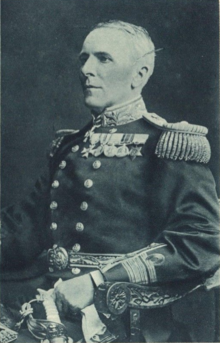Admiral Sir Richard Henry Peirse, KCB, KBE, MVO, DL (4 September 1860 – 10 July 1940)[2] was a senior Royal Navy officer during the First World War.
Sir Richard Henry Peirse | |
|---|---|
 Sir Richard H. Peirse c. 1915 | |
| Born | 4 September 1860 York, England |
| Died | 10 July 1940 (aged 79) |
| Allegiance | United Kingdom |
| Service | Royal Navy |
| Years of service | 1873–1919 |
| Rank | Admiral |
| Commands | Commander-in-Chief, East Indies Station HMS Commonwealth HMS Bedford HMS Dido |
| Battles / wars | Second Boer War First World War |
| Awards | Knight Commander of the Order of the Bath Knight Commander of the Order of the British Empire Member of the Royal Victorian Order Grand Officer of the Legion of Honour (France) Order of the Nile, First Class (Egypt) |
| Relations | Air Chief Marshal Sir Richard Peirse (son) Air Vice Marshal Sir Richard Peirse (grandson) |
| Other work | Deputy Lieutenant of the County of Somerset (1929)[1] |
Naval career
editPeirse joined the Royal Navy in 1873 and,[2] in 1885, developed a new naval director[3] which was to become the fire-control system used in all ships with large guns.[4] Promoted to captain in 1900,[5] he commanded HMS Dido during the Second Boer War.[6]
Promoted to rear admiral in February 1909,[7] Peirse was appointed Commander-in-Chief, East Indies Station in 1913.[8] Then promoted to vice admiral in October 1914,[7][9] he served in the First World War taking part in the attack on Smyrna in 1915,[10] where he outgunned the Turkish Fleet.[11] He continued in his role on the East Indies Station until December 1915.[12][13] He was promoted to admiral in March 1918.[14]
After the war Peirse became Naval Member of the Central Committee of the Board of Invention and Research.[15] He retired from the navy in January 1919.[16]
Personal life
editPeirse lived in Upper Norwood in London[17] and there is a memorial to him in Bedale Parish Church in North Yorkshire.[18]
He and his wife lived for many years at Fiesole on Bathwick Hill in Bath, Somerset before moving to Belmont in Combe Down, where he died in 1940.[19]
His son, Sir Richard Peirse, became air chief marshal.[20]
Awards and decorations
edit- Knight Commander of the Order of the Bath – 22 June 1914[21]
- Knight Commander of the Order of the British Empire – 7 June 1918[22]
- Member of the Royal Victorian Order – 9 October 1903[23]
- Legion of Honour, Grand officer (France) – 18 June 1918[24]
- Order of the Nile, First Class (Egypt) – 25 October 1918[25]
References
edit- ^ "No. 33548". The London Gazette. 1 November 1929. p. 6991.
- ^ a b "Enrolment record for Richard Henry Peirse". The National Archives. 15 July 1873. Retrieved 11 June 2014.
- ^ Fifty Years in the Royal Navy by Admiral Sir Percy Scott Bt.
- ^ Famous Conways
- ^ "No. 27211". The London Gazette. 17 July 1900. p. 4433.
- ^ Edinburgh Gazette
- ^ a b "Royal Navy Flag Officers 1904 – 1975". Archived from the original on 24 July 2011. Retrieved 29 August 2010.
- ^ HMS Swiftsure The Straits Times, 24 May 1913, Page 10
- ^ "No. 28984". The London Gazette. 24 November 1914. p. 9690.
- ^ Attack on Smyrna The Hobart Mercury, 8 March 1915
- ^ Turks' Fire powerless; Ottoman Guns Outranged by English; Landing Party Suffers Losses New York Times, 7 March 1915
- ^ One hundred years of Admirals
- ^ Royal Navy Flag Officers 1914–1918
- ^ "No. 30599". The London Gazette. 26 March 1918. p. 3756.
- ^ "No. 30730". The London Gazette (Supplement). 7 June 1918. p. 6686.
- ^ "No. 31162". The London Gazette. 4 February 1919. p. 1798.
- ^ National Archives
- ^ North Yorkshire County Council Archives
- ^ Bath Chronicle, 13 July 1940, p. 9
- ^ Air of Authority – A History of RAF Organisation – Air Chief Marshal Sir Richard Peirse Archived 20 November 2012 at the Wayback Machine
- ^ "No. 28842". The London Gazette (Supplement). 22 June 1914. p. 4876.
- ^ "No. 30730". The London Gazette (Supplement). 4 June 1918. p. 6686.
- ^ "No. 27604". The London Gazette (Supplement). 9 October 1903. p. 6149.
- ^ "No. 30756". The London Gazette (Supplement). 21 June 1918. p. 7305.
- ^ "No. 30979". The London Gazette (Supplement). 25 October 1918. p. 12697.